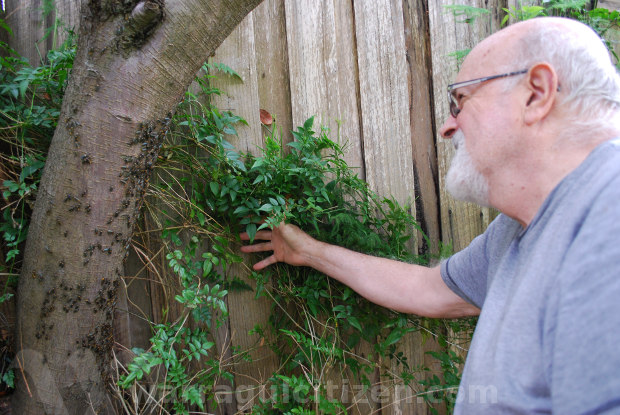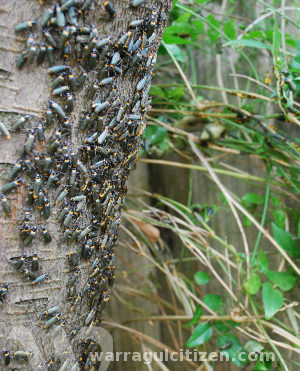![]()

THEY have invaded Baw Baw but will not hurt anyone. In fact they are probably helping your garden to thrive.
ADVERTISEMENT
Below: A swarm of Plague Soldier Beetles.
Images by author.
Large numbers of Plague Soldier Beetles have been reported across Baw Baw as the species thrives in what experts describe as “perfect” conditions.
Residents have reported seeing the long green-with-yellow beetles in large clusters covering trees since December.
ADVERTISEMENT
Warragul man David Steele says this is the first time he has noticed the beetles in 37 years in the area.
“I just haven’t seen huge numbers. There may have been one or two just floating around, but when you see them in such huge numbers you start to take notice,” Mr Steele said.
“On a sunny day they would take to the air in huge numbers and you’d just see them flying in the garden, and that’s before I noticed them just sitting in the trees.
“They haven’t been very active. I think they are mating at the moment.”
Monash University research fellow Doctor Damian Dowling told The Warragul Citizen the beetles reached plague proportions in parts of Melbourne this summer and last summer.

“The beetles swarm to mate, forming huge mating aggregations,” Dr Dowling said.
“They will disperse following mating, and become relatively unnoticeable again.
ADVERTISEMENT
“The environmental conditions are obviously perfect right now to trigger their aggregation for mating.”
Dr Dowling said he is uncertain what triggers the movements of the beetles, but it is unlikely the beetles will lay their eggs in the areas they were reported.
“Where the beetles swarm to mate won’t necessarily be, and probably won’t be, where the females lay their eggs.”
Dr Dowling said the numbers are not alarming as the beetles pose no risk to people.
“It is presumed they are not a significant garden pest, and might even be a good addition to the garden since they are thought to feed on other pests such as aphids.”
“Because of this it is thought that there is no need or point in controlling their numbers.”
Monash University Professor Steven Chown and academic Doctor Melodie McGeoch explained good rainfall since 2009 has helped improve conditions for the beetles.








